The semi-final stage of the World Cup has, on balance, not been particularly kind to France. In 1958, the free-scoring team of Just Fontaine and Raymond Kopa were more than holding their own against Brazil until Vavá clattered into the captain Robert Jonquet; as the defender’s leg sailed in an arc across the Stockholm sky, France’s hopes and dreams, in those days before substitutes, departed with it. In 1986, Les Bleus faced West Germany with star man Michel Platini only half-fit; the rest of the team failed to turn up until the last 10 minutes or so, by which time it was far too late. Even when the French finally won a semi, against Croatia in 1998, the popular defensive lynchpin Laurent Blanc got himself suspended for the final – unluckily and yet foolishly – by needlessly waving his arms near the face of Slaven Bilic, asking for the trouble that would soon be delivered to him in spades.
But nothing comes close to 1982. Nothing will ever come close to 1982.
The 1982 World Cup semi-final between France and West Germany at Sevilla’s Estadio Ramón Sánchez-Pizjuán is remembered – not solely, but mainly – for the most outrageous and notorious foul in World Cup history. Forget Werner Liebrich on Ferenc Puskas, Mario David on Leonel Sánchez, Luís Pereira on Johan Neeskens, Benjamin Massing on Claudio Caniggia, Mauro Tassotti on Luis Enrique, or even Zinedine Zidane on Marco Materazzi. In the 57th minute of this match, French captain Platini noticed a sizable gap between the West German defenders Manni Kaltz and Uli Stielike, with Patrick Battiston racing into it, and stroked a pass of insouciant majesty into his team-mate’s path. Battiston, clear on goal with only the outrushing German keeper Toni Schumacher to beat, was first to a ball that was sitting up almost perfectly. At which point …
… well, more of that anon. Perhaps the most unfortunate aspect of what was about to unfold – though Battiston and his dental surgeon will doubtless disagree – is that an infamous act of brutal cynicism to this day casts a long, dark shadow across a match which really should be principally remembered as one of the greatest, most dramatic and entertaining World Cup encounters of all time. A back-and-forth, six-goal, bona fide thriller between two teams packed with top-drawer talent performing at full pelt, it’s right up there with a select bunch of Coupe du Monde classics: arguably only the 1950 Maracanaço “final”, the 1954 Hungary-Uruguay semi, and the sun-kissed stunner served up by Italy and Brazil in Barcelona a mere three days before this fixture have ever bettered it. And yet. “We had played one of the two best games in the tournament,” recalled the hugely likeable West German winger Pierre Littbarski long after the dust had settled, “and it was very good publicity for German football.” Cue deep sigh. “Or it would have been.”
The way most of it panned out, it certainly should have been. Not that a story for the ages was guaranteed to be told. Easy to forget now, but neither team had particularly impressed en route to the semis. France were 33-1 outsiders at the start of the competition, and for a while it looked like the bookies knew exactly what they were talking about. Michel Hidalgo’s side could hardly have begun their campaign in a more abject fashion, falling a goal behind after 27 seconds to an England side which had only just scraped through qualifying and were notoriously goal-shy. That match was comprehensively lost 3-1, and France only scraped through the first group stage after beating the minnows of Kuwait 4-1, then drawing 1-1 with Czechoslovakia – the latter result only secured thanks to a last-minute clearance off the line by Manuel Amoros. (Czechoslovakia’s goal, incidentally, was scored by Antonin Panenka, in what would be his last international match. Could it have been anything other than a penalty?) France then found themselves in the easiest of the four second-round groups, lumped in with Austria and Northern Ireland, but even then the meal they made of progress would have put Auguste Escoffier to shame. Despite thoroughly dominating the Austrians, they could only win by a single goal, and while they rolled over the Northern Irish 4-1 to make the last four, things may have panned out differently had Martin O’Neill’s early strike not been preposterously disallowed.

West Germany, second favourites from the outset behind Brazil, had somehow managed to be even worse. The first group stage was a heady cocktail of debacle and disgrace: a hubristic defeat to Algeria after promising to dedicate “the seventh goal to our wives and the eighth to our dogs”, followed swiftly by the shameful and depressing “Anschluss” pact with Austria. German efforts in the second group stage didn’t particularly win over the crowds either: a goalless grind with England, then the clinical win over the hosts Spain. But there was world-class talent in their team – Littbarski, European footballer of the year Karl-Heinz Rummenigge, Klaus Fischer, Paul Breitner – and someone surely had to deliver at some point. Ditto the French, who might have been no great shakes at the back, but had a midfield – Platini, Jean Tigana, Alain Giresse – wondrous enough to paper over any cracks, and were perhaps hitting their stride at exactly the right time. (Hidalgo had cited the response to the O’Neill warning shot against Northern Ireland as the best performance of his six-year reign as coach to date.)
The form book didn’t promise a great deal, but never mind that, because the match would deliver pretty much everything. West Germany came flying out of the blocks. The tricksy Littbarski had been the star turn against Spain, scoring one and setting up another, and he continued where he left off, embarking on a dangerous slalom into the French area in the first couple of minutes. Then on the quarter hour, he battered a free kick off the crossbar with such force that the ball whistled straight back outside the box. Three minutes later he had scored the opening goal, firing low and hard through a thicket of legs after good work from Breitner and Fischer had caused bedlam in the French penalty area. It was Littbarski’s eighth goal in 13 appearances since debuting the previous autumn; the 22-year-old was wasting no time in announcing his talent.
France took less than 10 minutes to attain parity, Bernd Forster grappling with Dominique Rocheteau in the area, Platini slotting the penalty by sending Schumacher the wrong way with a confident sidefoot. At which point the game developed something of an edge, a harbinger of things to come. Kaltz and Bernard Genghini had already traded petty hacks, and Giresse was booked for kicking the ball away in a petulant manner after conceding a free kick. It was Schumacher, though, who really raised the temperature. On 35 minutes, he gathered a backpass and pointlessly rolled forward into Platini, making an impression on the French captain’s thigh. Four minutes later, mopping up a Tigana cross, Schumacher happily allowed his forward momentum to pin a hapless Didier Six to the floor, held him down a tad longer than was strictly necessary, just to make a point, then shoved the striker away as the pair finally disentangled. Platini entreated the keeper to simmer down, but Schumacher’s laser eyes were trained only on the entirely innocent Six, lost in a sociopathic reverie.
The game was turning sour. The Germans went straight down the other end of the pitch, Kaltz romping along the right wing in acres. He was scythed down by the cheesewire leg of Genghini, who earned himself a booking. But there were too many artists in residence for the match to totally degenerate into thuggish nonsense. From the resulting free kick, Giresse and Tigana triangulated majestically in their own area to play their way out of trouble – the sort of audacious risk-taking escape likely to give Brendan Rodgers warm, tender, wobbly feelings in his dreams – allowing Six and Rocheteau to stream upfield with extreme prejudice. The pitch-length move ended with Platini, on the left-hand corner of the German box, whistling a forensic strike inches wide of the top-right corner. It would have been the goal of the tournament. Up to that point, anyway.
All square at half time, after 45 minutes in which beauty had smothered brutality. But there was an abrupt shift in tone after the restart. A mere 34 seconds of the second half had elapsed when Forster highkicked Rocheteau in the back, an absurd kung-fu assault which elicited a deliciously Gallic “Oh la la!” from the commentary team on French television. Yellow card.
On 50 minutes, Battiston came on for the injured Genghini. Within 60 seconds, he’d romped down the inside-left channel and sent a long-distance shot wide left of goal. He looked in the mood.
As did France, who were gaining the upper hand. In quick succession, they had three golden chances to take the lead. First Kaltz played a ludicrous blind square pass through the centre circle, allowing Tigana to romp downfield with the ball. He slipped Platini free down the middle, only for the flag to go up for offside. Tigana and Platini exchanged dagger glances, throwing arms, rolling eyes and mouthing insults in the stereotypical expressive style. Then Rocheteau had a goal harshly disallowed having won a fairly innocuous aerial battle with Forster. Finally Platini, carving out a chance for himself with a skitter down the left, shot high from the edge of the area, the ball sailing deep into the crowd.
Platini’s shot was the catalyst for the moment which would come to define and overshadow this match, the reputation of the West German team throughout the 1980s, and the entire careers of two of European football’s top talents. The French fans behind Schumacher’s goal took an age to return the ball. When it was finally dispatched back on to the field of play, the German keeper – barely calmer since the incident with Six in the first half, his lid still clattering away under pressure from internal steam – shaped to throw the ball with force back into the Gallic throng, but aborted mid-fling and placed it down for a goal kick instead. Almost exactly one minute later, give or take a second, Platini’s gorgeous pass was bouncing towards his area with Battiston sure to meet it first. The Frenchman guided a first-time shot past the outrushing Schumacher and inches wide of the right-hand post. Most eyes, including the referee and the lens of the main TV camera, followed the ball as it made its way into touch. One member of the French commentary team, however, had kept his gaze on Battiston.

“Ay ay ay!”
Battiston had made contact with the ball just inside the D. At this point, Schumacher was still a good four yards inside his area, scampering off his line in a futile chase. The keeper had plenty of time to change direction, or stop dead in his tracks, but instead chose to plough on, leaping into Battiston and turning his body in mid air. His hip clattered into Battiston’s face, knocking the French midfielder out instantly and sending him crashing to the turf. As Battiston lay motionless, surrounded by frantic team-mates, Schumacher calmly placed the ball on the left-hand corner of the six-yard box and hung around nonchalantly, chewing gum, waiting to take the goal kick.
He would have a four-minute wait. Battiston, minus three teeth, was loaded on to a stretcher and carried off the field, where he would be given oxygen before being taken to hospital. Platini held his fallen comrade’s limp hand as he was carted off. It should have been a penalty to France, and a red card for Schumacher, but there would be no punishment. The keeper restarted the game with the goal kick.

Much opprobrium was heaped on to Dutch referee Charles Corver for his lack of action, though our man David Lacey was sympathetic to the official: “To be fair, the quality of Platini’s pass to Battiston was such that Corver was as much taken by surprise as the defence and could not have had a clear view of the incident. In fact, the severity of Schumacher’s assault only became fully apparent when seen from behind the French goal.”
Still, it was one of the great outrages in World Cup history – “The nearest linesman should not have missed it,” was Lacey’s caveat – and what’s worse, there would be no karmic payback. To the contrary.
France dominated the remainder of the second half, but while Schumacher might have been the villain of the piece, he was no charlatan. He smothered Six’s shot, then denied Rocheteau, both from close range. Young Amoros, who had only won his first cap five months earlier, cut inside from the left and rattled the bar in injury time (“Ay ay ay ay ay!”) and while there was still time for Breitner and Fischer to force an heroic double save from Jean-Luc Ettori, there was no doubt who had been the better side as the referee blew for full-time. Which was something France set about proving at the start of extra time: within nine minutes they were 3-1 up, Marius Trésor spinning and roofing a spectacular volley, Giresse battering another in off the left-hand post from the edge of the area. France were surely through to their first World Cup final.
The French started pinging the ball around in a most aesthetically pleasing manner, the majority of the stadium responding, appropriately, with a series of olé!s. Justice is one thing; hubris quite another. Giresse was dispossessed with a crunching tackle, West Germany flooded upfield, Littbarski made room for himself down the left, and sent a cross to the near post which was flicked home adroitly by the substitute Rummenigge who, half-fit, had only come on to the pitch five minutes previously with the game slipping away from the Germans. Suddenly, the momentum had shifted. For West Germany, it was back on.

In the remaining two minutes before the turnaround, Breitner and Littbarski took turns to fire low, dangerous crosses through the French six-yard box from the right. The tide had turned, and within three minutes of the start of the second period of extra time, West Germany equalised with one of the most spectacular and exquisite finishes in World Cup history. The astonishing Littbarski made good down the left and hoicked a cross to the far post for Horst Hrubesch, who headed back into the centre. Fischer, his back to goal, stuck out his right peg and guided a glorious overhead kick into the top right. Gymnastic brilliance allied to deadly precision, an outstanding effort in the circumstances.
West Germany spent the remainder of the match coming at France, but couldn’t make the breakthrough. France meanwhile were spent; the nearest they came to scoring was into their own net, Tresor breaking up a German attack by flicking a ball towards the bottom-left corner of the French goal, a panicked backpass which was thankfully close enough to Ettori for the keeper to smother. A dramatic classic simply couldn’t end in high farce.
The resulting penalty shoot-out – the first in any World Cup – was only ever going to end one way: with Schumacher the hero. The German keeper made two fine saves, from Six and Bossis, to Ettori’s one from Stielike. West Germany were through to the final, while France, and viewers from the 107 other Fifa nations who had entered the 1982 World Cup, were heartbroken. No happy ending.
A sporting catastrophe for the French, although in some ways also for the Germans, who had more than played their part in a stone-cold classic, launched one of the greatest comebacks in World Cup history with two stunning goals in the most pressurised of situations, and (whisper it) were probably the better team, both on the night and overall. Yet none of that would be remembered, Schumacher having done what Schumacher did. Sympathy for West Germany was, and still is, in short supply. Understandably so, though it takes a hard heart not to feel sorry for the wholly innocent Littbarski, whose man-of-the-match performance is nowadays all but forgotten, blotted from the memory by his goalkeeper’s crass hoodlummery.
Poor Battiston was discharged from hospital the day after, having broken two of his teeth. Schumacher – “hopefully not being too cruel,” wished this newspaper’s World Cup diarist – immediately offered to pay for both of them to be capped. Four years later, the two teams, and the two players, met again at the same stage in Guadalajara. With France a goal down and battling to salvage a draw, Battiston hit a late shot straight at Schumacher. The fairytale narrative would have seen the keeper fumble the ball into his own net, France going on to reach the final. But Schumacher saved well, his effigy, hung by the French support behind his goal, clearly bereft of voodoo properties. The Germans then scampered upfield, where Rudi Völler sealed the deal. West Germany 2-0 France, in more ways than one.
No redemption for the French, then, who had to make do with the knowledge that the Germans went on to lose both the 1982 and 1986 finals. But schadenfreude only soothes the soul so much, when your own hopes and dreams have been dashed so cruelly. So yes, the World Cup semi-finals have not particularly kind to France. But they’ve been downright cruel to poor old Patrick Battiston. Ay ay ay.


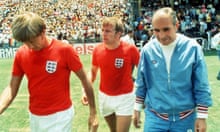
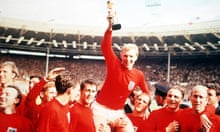
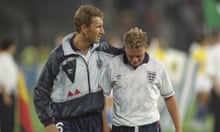

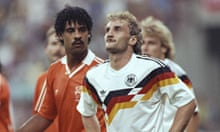
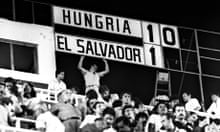
Comments (…)
Sign in or create your Guardian account to join the discussion